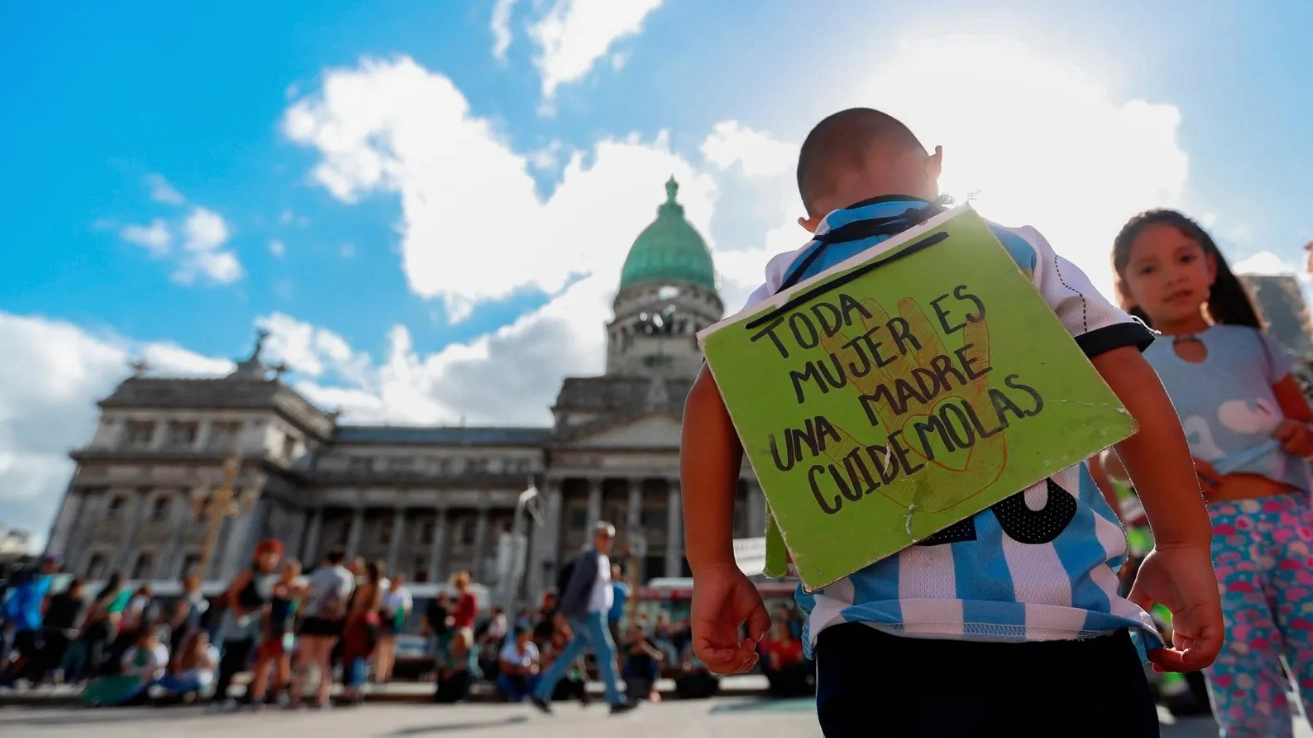Gender equality is an ongoing process both globally and locally. Argentina showcases interesting progress in this regard, with Argentinians recognizing advancements in women’s roles in politics and the workforce. However, when it comes to changes in household values, the transformation into concrete practices doesn’t materialize as swiftly.
In 2015, feminist movements gained visibility with the first #NiUnaMenos collective march, which evolved into a rallying cry across the region. Voices against gender violence were later joined by calls for the legalization of abortion, and the “green wave” transcended geographical and legal boundaries. With the enactment of the Voluntary Interruption of Pregnancy Law in January 2021, Argentina became one of the first countries in the region to provide free, voluntary, and safe abortion, ending the criminalization of women for terminating pregnancies.
The increased institutional presence of the feminist fight became more evident with the enactment of the Micaela Law in January 2019. This law establishes mandatory training on gender and violence against women for all individuals in the Executive, Legislative, and Judicial branches of the nation’s government, across all levels and hierarchies. In the same year, the Ministry of Women, Gender, and Diversity of the Nation was established, setting a crucial precedent for the proliferation of ministerial bodies at the provincial level.
According to a global report conducted in 39 countries by the Worldwide Independent Network of Market Research (WIN) and Voices! Research & Consultancy, Argentina’s perception of progress in workplace equality aligns with the global perspective. In terms of political equality, it slightly surpasses the global average. However, regarding gender equality within the home, Argentinians are more pessimistic than the global average, with 61% versus 71%, respectively.
While there’s still a long road ahead, women’s participation in the labor force has steadily increased over time, a noteworthy achievement. Argentina is the region’s leader in terms of perceiving equal job opportunities and is among the countries with the highest expectations that women will receive equal pay for equal work within the next 25 years.
Nonetheless, 34% of Argentinians believe that women have fewer job opportunities, and 32% think women earn less than men. This gender wage gap is more recognized by Argentine women than men. The fact that this perception gap is larger among women is a clear example of the significant dissonance that persists in other indicators.
In this context, both men and women agree that women are primarily responsible for household and caregiving tasks, yet they hold differing perceptions regarding male involvement. Fathers claim to engage more in childcare-related tasks than women think (once again highlighting significant gender dissonance). For instance, regarding school-related tasks, nearly 6 out of 10 fathers state they assist their children, but only one-third of women report fathers participating. Similar disparities arise for attending parent meetings or transporting children to activities.
Women dedicate twice as much time to home and children as men do, and even when women work, the gap with male involvement remains striking. The fact that women working reduces their participation without increasing male involvement (except for communication with schools and other families) raises questions about whether fathers overestimate their contribution or women under acknowledge it. For all other measured activities, “the tribe” is called upon, that is, the participation of men remains the same and what is growing is the involvement of other family members and, to a lesser extent, the involvement of other non-family members.
Despite everything mentioned earlier, Argentine women highly value family life (alongside Spain, the United States, Poland, Mexico, and Pakistan) and express satisfaction, while also evaluating themselves as mothers quite positively. Nevertheless, the new values transmitted through gender equality fighting have instilled a different way of engaging with caregiving and household tasks. It’s no longer solely about striving for the ideal role of a perfect homemaker in service to the “provider” man; it’s now more about achieving autonomy and pragmatism that allow women to balance their various roles both inside and outside the home.
Nevertheless, the rights acquired by women come at a “cost” that must be addressed. In actual practices, progress toward real gender equality lags far behind discourse, meaning that the legitimate model of domestic responsibility remains predominantly female.
Disparities in household burdens conflict with greater equality of job opportunities, leading to a heavier burden on women. Seven out of ten women assert that on a typical day, they don’t have time for themselves (a percentage nearly twice that of men).
The Micaela Law and the Voluntary Interruption of Pregnancy Law represent milestones in the feminist fight and serve as clear indicators that gender progress in Argentina is undeniable. The vast majority of Argentines believe that the social and political role of women is changing in the country. A quarter of them even claim to have personally taken actions in support of gender-related issues. The challenge now lies in narrowing the gap between values and practices, while bringing the achievements of feminist movements in the labor and political spheres into the domestic and personal realm.
*This text is written within the framework of the X WAPOR Latam congress: www.waporlatinoamerica.org.












